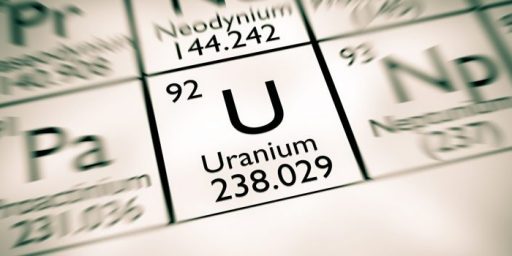Saddam, Niger, and British Intelligence
Financial Times – Inquiry will back intelligence that Iraq sought uranium
UK government inquiry into the intelligence used to justify the war in Iraq is expected to conclude that Britain’s spies were correct to say that Saddam Hussein’s regime sought to buy uranium from Niger. The inquiry by Lord Butler, which was delivered to the printers on Wednesday and is expected to be released on July 14, has examined the intelligence that underpinned the UK government’s claims about the threat from Iraq.
The report will say the claim that Mr Hussein could deploy chemical weapons within 45 minutes, seized on by UK prime minister Tony Blair to bolster the case for war with Iraq, was inadequately supported by the available intelligence, people familiar with its contents say . But among Lord Butler’s other areas of investigation was the issue of whether Iraq sought to buy uranium from Niger. People with knowledge of the report said Lord Butler has concluded that this claim was reasonable and consistent with the intelligence.
President George W. Bush referred to the Niger claim in his state of the union address last year. But officials were forced into a climbdown when it was revealed that the only primary intelligence material the US possessed were documents later shown to be forgeries.
The Bush administration has since distanced itself from all suggestions that Iraq sought to buy uranium. The UK government has remained adamant that negotiations over sales did take place and that the fake documents were not part of the intelligence material it had gathered to underpin its claim.
A related story: Iraq missile claim ‘not supported’
The claim that Saddam Hussein could deploy chemical and biological weapons within 45 minutes – seized on by Tony Blair to back the case for war with Iraq – was inadequately supported by the available intelligence, Lord Butler’s report is expected to conclude.
The claim that Iraq could launch an attack using weapons of mass destruction within 45 minutes of an order being given was made four times in the government’s dossier on Iraq’s WMD issued in September 2002, including in Tony Blair’s foreword. But Lord Butler’s report into the use of intelligence material to justify the war in Iraq is said by those familiar with its contents to have examined the “45 minutes” issue in detail and found it wanting. The report, which was delivered to the printers on Wednesday and is expected to be released on July 14, is expected to conclude that the intelligence to substantiate the claim was of insufficient quality, and that the intelligence material gathered on Iraq was generally inadequate.
Jon Henke predicts, “It will not be noted by the DNC. No retraction will be forthcoming from the appropriate corners.” Glenn Reynolds guesses the story is “unlikely to make the front page of the New York Times tomorrow.” Probably not.
I’m not sure what the story proves that we didn’t already know. Even if one thinks President Bush was so hell-bent on invading Iraq that he was willing to seize upon any scrap of evidence to gin up the case, I know of no one who thinks Tony Blair was going to buck the popular will of the British public and the dominant opinion in his own party on evidence he thought was made up.
This doesn’t prove that Saddam actually acquired nuclear materials from Niger. Since it isn’t documented in the news report, one presumes no such finding was made. Nor does it particularly matter at this point. It is incontrovertibly true, undisputed by knowledgable people in either party in the US, the UK, France, Germany, or the UN Security Council that Saddam tried to obtain weapons grade nuclear materials for two decades. Indeed, we know that he had very advanced nuclear programs in 1981 when the Israelis took out Osirik and again in the early 1990s, when we discovered them after Desert Storm.
It’s simply amazing that things which have been articles of faith for years–that Saddam had chemical weapons, that Saddam was actively seeking nuclear capability, and that Saddam was strongly allied with terrorist groups–are suddenly considered “lies” by opponents of the current administration. Certainly, there are many reasons for Democrats to oppose policies of the Bush Administration and to prefer Kerry-Edwards over Bush-Cheney. There are even reasons to have opposed/continue to oppose the invasion of Iraq. But this ain’t one of ’em.
Update: Pejman Yousefzadeh has some thoughts as well.
Update (7/8): Retired intelligence analyst Herb Ely offers a counter-point.



